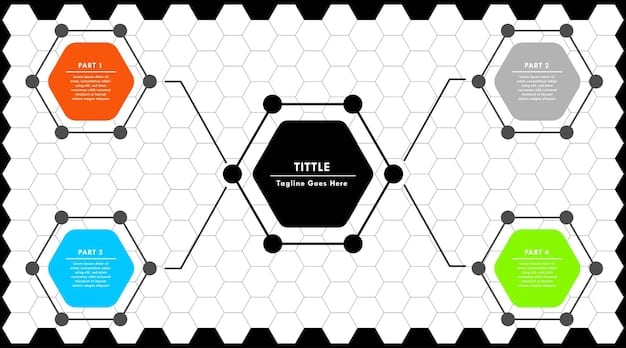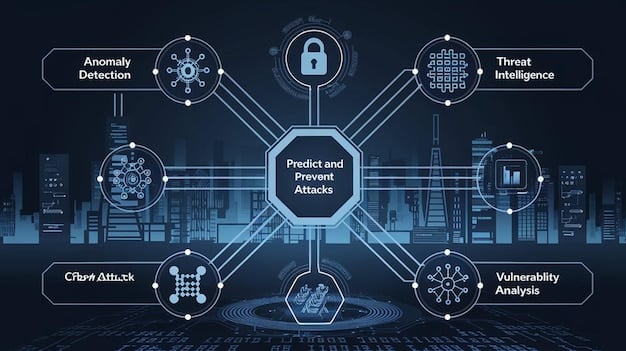The Rise of DAOs in the US Tech Sector: A 2025 Analysis

The Rise of Decentralized Autonomous Organizations (DAOs) in the US Tech Sector: A 2025 Analysis reveals a transformative shift in how tech companies are structured and operated, fostering greater transparency, community involvement, and innovation. This analysis explores their increasing prevalence and impact on the US tech industry.
The tech landscape in the United States is undergoing a significant transformation, driven by the emergence of Decentralized Autonomous Organizations (DAOs). These innovative entities are reshaping traditional business models, fostering greater transparency, and empowering communities within the tech sector. As we look ahead to 2025, it’s crucial to understand the rise of Decentralized Autonomous Organizations (DAOs) in the US Tech Sector: A 2025 Analysis and their potential impact.
This article delves into the key aspects of this phenomenon, exploring the driving forces behind its growth, the challenges DAOs face, and the opportunities they present for the future of technology in the US.
Understanding the DAO Phenomenon
Decentralized Autonomous Organizations (DAOs) represent a paradigm shift in organizational structure. Unlike traditional companies with hierarchical management, DAOs operate based on rules encoded in smart contracts on a blockchain.
These rules govern how decisions are made, how funds are allocated, and how the organization functions overall. This section will explore the fundamental principles and benefits of DAOs.
Key Characteristics of DAOs
DAOs are distinguished by several key attributes:
- Decentralization: Decision-making power is distributed among token holders rather than concentrated in the hands of a few executives.
- Transparency: All transactions and governing rules are recorded on a public blockchain, fostering greater visibility and accountability.
- Autonomy: Smart contracts automatically execute the rules of the organization, reducing the need for intermediaries and administrators.
- Community-Driven: DAOs empower communities to participate in the governance and direction of the organization.
Benefits of Embracing DAOs
The adoption of DAOs can bring numerous advantages to tech companies:
- Increased Transparency: Blockchain-based operations lead to increased trust.
- Enhanced Security: Smart contracts reduces the risk of fraud
- Greater Efficiency: Automation streamlines decision-making.
In summary, DAOs are a new way to organize. The rise of Decentralized Autonomous Organizations (DAOs) in the US Tech Sector: A 2025 Analysis shows this new form of organization can be very beneficial to the tech sector.

Driving Forces Behind DAO Growth in the US Tech Sector
Several factors are contributing to the growing popularity of DAOs in the US tech sector. These include technological advancements, changing attitudes toward governance, and the desire for more inclusive and equitable organizational models.
Understanding these driving forces is key to appreciating the significance of DAOs.
Technological Advancements
The development of blockchain technology and smart contracts has laid the foundation for DAOs. These technologies provide the necessary infrastructure for DAOs to operate securely and efficiently.
Changing Attitudes Toward Governance
There is a growing desire for more democratic and participatory forms of governance. DAOs offer a way to empower individuals and communities to have a greater say in the decisions that affect them.
Demand for Greater Equity
DAOs offer a way to distribute ownership and rewards more equitably. This can be particularly appealing to tech workers and creators who feel that traditional companies do not adequately compensate them for their contributions.
These forces indicate that the rise of Decentralized Autonomous Organizations (DAOs) in the US Tech Sector: A 2025 Analysis is more than just a fad; it’s a fundamental shift in organizational thinking.
Challenges and Obstacles for DAOs
While DAOs offer many potential benefits, they also face a number of challenges and obstacles. These include regulatory uncertainty, security risks, and governance complexities.
Addressing these challenges is crucial for the long-term success of DAOs.
Regulatory Uncertainty
The legal and regulatory landscape for DAOs is still evolving. There is a lack of clarity on how DAOs should be treated under existing laws, which creates uncertainty for businesses and investors.
Security Risks
DAOs are vulnerable to security breaches and exploits. Smart contracts can contain bugs or vulnerabilities that can be exploited by malicious actors. This is still a big issue for the rise of Decentralized Autonomous Organizations (DAOs) in the US Tech Sector: A 2025 Analysis.
Governance Complexities
DAOs can be difficult to govern effectively. It can be challenging to design governance mechanisms that are fair, efficient, and resistant to manipulation. DAOs need to be sure they are addressing these complexities as a priority.
Despite these challenges, DAOs are working to address these obstacles and build more robust and resilient organizations.

DAOs in Practice: Examples in the US Tech Sector
Several DAOs have already emerged in the US tech sector, showcasing the practical applications of this innovative organizational model. These examples demonstrate the diversity and potential of DAOs.
Examining these real-world cases provides valuable insights into the workings of DAOs.
DAO Project 1
A DAO focused on open-source software development, enabling community members to contribute, vote on project priorities, and share in the project’s success.
DAO Project 2
A DAO that invests in and supports early-stage tech startups, allowing token holders to participate in the investment decision-making process and share in the returns.
DAO Project 3
A DAO focused on content creation. This can empower artists and content creators by giving them more control over their work and how it is monetized.
These examples illustrate the rise of Decentralized Autonomous Organizations (DAOs) in the US Tech Sector: A 2025 Analysis can vary greatly depending on the goals and objectives of its founders and members.
The Future of DAOs in the US Tech Sector
Looking ahead to 2025, the future of DAOs in the US tech sector appears promising. As the technology matures, regulations become clearer, and best practices emerge, DAOs are likely to become more mainstream and widely adopted.
This section explores the potential future developments and impact of DAOs.
Increased Mainstream Adoption
DAOs are expected to become more common in the US tech sector as awareness and understanding of their benefits grow. This could lead to the emergence of DAO-based companies in a variety of industries.
Development of DAO Tooling and Infrastructure
The ecosystem of tools and infrastructure supporting DAOs is likely to expand and improve. This will make it easier for individuals and organizations to create, manage, and participate in DAOs.
Greater Regulatory Clarity
Governments and regulatory bodies are expected to provide greater clarity on the legal and regulatory status of DAOs. This will reduce uncertainty. This is an important aspect of the rise of Decentralized Autonomous Organizations (DAOs) in the US Tech Sector: A 2025 Analysis
The transformation of the tech sector through DAOs is expected to be long-lasting, changing how companies are formed, how people work, and how value is distributed.
Implications for the Broader Tech Ecosystem
The growth of DAOs has broader implications for the entire tech ecosystem. This organizational model fosters a new type of company that is more transparent, community-driven, and equitable, which affects innovation and collaboration.
This transformation can reshape the dynamics of the tech sector.
Fostering Innovation
DAOs can foster innovation by encouraging greater participation and collaboration. By distributing decision-making power and providing incentives for contributions, DAOs can unlock new ideas and solutions.
Promoting Greater Transparency
DAOs promote greater transparency and accountability. This can help build trust between tech companies and their stakeholders, including customers, employees, and investors.
Creating More Equitable Organizations
DAOs can create more equitable organizations by distributing ownership and rewards more fairly. This can attract and retain talent, improve employee morale, and foster a more inclusive work environment.
Ultimately, the rise of Decentralized Autonomous Organizations (DAOs) in the US Tech Sector: A 2025 Analysis highlights a move towards a more open, value-driven structure.
| Key Aspect | Brief Description |
|---|---|
| 💡 Definition of DAOs | Organizations governed by rules encoded in smart contracts on a blockchain. |
| 🚀 Driving Forces | Technological advancements, changing governance attitudes, and demand for greater equity. |
| 🚧 Key Challenges | Regulatory uncertainty, security risks, and governance complexities. |
| 🔮 The Future | DAOs transforming tech, innovating company structures, and fostering open-value driven organizations. |
Frequently Asked Questions
DAOs are organizations governed by rules encoded in smart contracts on a blockchain, enabling decentralized decision-making and greater transparency. They represent a new organizational model in the tech sector.
Unlike traditional companies with hierarchical management, DAOs operate based on consensus among token holders, with rules automatically enforced by smart contracts, resulting in more distributed power.
Key benefits include increased transparency, enhanced security, greater efficiency, and the potential to create more equitable and inclusive organizations within the US tech landscape.
DAOs face challenges such as regulatory uncertainty, security risks (smart contract vulnerabilities), and governance complexities, all of which need to be addressed for long-term success.
The future looks promising, with expectations of increased mainstream adoption, development of better tooling, and greater regulatory clarity, positioning DAOs as a significant force in the tech industry.
Conclusion
The rise of Decentralized Autonomous Organizations (DAOs) in the US Tech Sector: A 2025 Analysis demonstrates a transformative shift towards more transparent and community-driven organizational models. As technology evolves and regulations become clearer, DAOs promise to reshape the dynamics of the tech industry.
By embracing these innovations, the US tech sector can foster greater innovation, equity, and collaboration, paving the way for a more inclusive and sustainable future.





